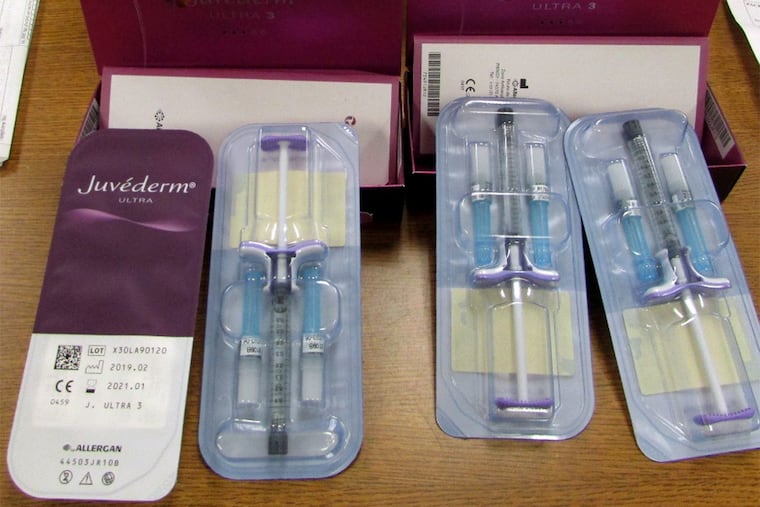Thinking of getting a nonsurgical cosmetic procedure with dermal filler? Here’s what you need to know.
Dermal filler injections can be dangerous if they're not done by licensed medical practitioners. Here's how the FDA recommends staying safe.

The death of a 20-year-old British tourist who received illegal silicone buttock-enhancement injections at a Philadelphia airport hotel resulted in a murder conviction for provider Padge-Victoria Windslowe, who had called herself “Black Madam.”
Almost a decade after the 2015 conviction that drew international attention, the problem of black-market cosmetic injections persists in the Philadelphia region and nationally.
Almost weekly, illegal shipments of dermal fillers — either counterfeits of the legal versions or pirated goods sold without a prescription under brand names Juvéderm, Orthovisc, and Revanesse — enter the country on cargo planes after unlicensed individuals purchase them online using their home mailing address, according to U.S. Customs and Border Protection (CBP).
In the last two years, CBP officers in the Baltimore Field Office, which includes Philadelphia, seized 153 shipments of illicit dermal filler. Federal authorities warn that products purchased online may be counterfeit or contaminated.
» READ MORE: A ‘butt lift’ from an illicit Philadelphia med spa sent a woman to the hospital with a raging infection
Cosmetic silicone injections, like the ones administered by Windslowe, are not approved by the U.S. Food and Drug Administration (FDA). The FDA regulates non-silicone dermal fillers and maintains a list of approved ones.
Under state and federal laws, only licensed medical practitioners can purchase, prescribe, and inject them. Federal prosecutors have arrested and charged unlicensed and untrained providers, who can face prison sentences and fines.
Dermal fillers can be used to smooth facial wrinkles or increase fullness of lips and cheeks. The FDA does not recommend using dermal fillers to increase buttock size, but a licensed medical professional can do so by administering it “off label.”
In Pennsylvania, the Department of Health does not license, regulate, or routinely inspect med spas, or medical centers that provide nonsurgical cosmetic treatments. Under state regulations, only a doctor or a physician group can own a med spa.
Individuals who are considering nonsurgical buttock enhancement with dermal fillers should check to make sure the provider is properly licensed and trained, said Lauren Grant, a registered nurse with the Medspa MD Group, which has offices in Newtown Square and Houston.
“It’s really concerning to me when you have people who are unknowledgeable about the procedure that just think it’s about making money and they are not concerned about the person’s health at all,” Grant said.
Grant said most legitimate med spas will take a full medical history from the client, prescribe antibiotics as a precaution before and after the dermal filler-injection procedure, ensure injection tools are sterile, and use ultrasound equipment to guide injection locations.
She also said if the price seems too good to be true, it probably is. Typical price is a minimum of $10,000 for a nonsurgical Brazilian butt lift using about 40 vials of dermal filler.
“This procedure is not cheap by any means,” Grant said. “People think, ‘Oh, it’s cheap.’ That should be your first red flag.”
Here’s some FDA recommendations for staying safe:
Go to a licensed health-care provider who has experience in the fields of dermatology and plastic surgery. Ask providers about their training and experience injecting dermal fillers.
Make sure the provider uses properly labeled, sealed vials or prefilled syringes of FDA-approved filler.
Learn what type and brand of filler will be injected and ask about potential health risks.
Be aware that it may be difficult or impossible to remove some fillers. You may need surgery to remove them.